“I feel that I’m in on the ground floor of something that human beings will be concentrating on for the next 1,000 years – if we don’t destroy ourselves in the meantime. It’s possible that 50 years from now we’re going to end up out of this solar system, batting around the universe, at least within our galaxy, investigating other stars and other systems.”
~Deke Slayton
NASA Mercury Seven Introduction

Slayton wasn’t wrong … as you will soon see.
====================================
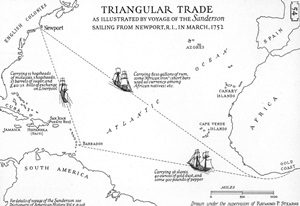
1774 – Rhode Island became the first colony to prohibit importation of slaves.
Stephen Hopkins, a signer of the Declaration of Independence, introduced a bill while serving in the Rhode Island Assembly in 1774 that prohibited the importation of slaves into the colony, and this became one of the first anti-slavery laws in the United States.
In the years after the Revolution, Rhode Island merchants controlled between 60 and 90 percent of the American trade in African slaves.
The Colonial town of Newport played a leading role during the “Triangular Trade” era. At the peak of what historians commonly call the “Golden Age,” Africans comprised nearly 20% of the total town population with one in three Newport families owning at least one slave.
By 1774, the slave population of Rhode Island was nearly twice as high as any other New England colony. Several prominent Rhode Island merchant families actively engaged in the slave market, most notably the Browns who had a strong connection to Brown University.
It is sometimes erroneously supposed that Brown University was named after John Brown, whose commercial activity included the transportation of African slaves.
In fact, Brown University was named for his nephew, Nicholas Brown, Jr. – a philanthropist, co-founder of Butler Hospital, and an ardent abolitionist.
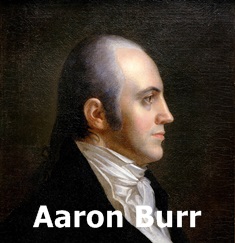
1807 – President Thomas Jefferson received a subpoena to testify in the treason trial of his former vice president, Aaron Burr. In the subpoena, Burr asked Jefferson to produce documents that might exonerate him.
Burr had run a close and contentious campaign against Jefferson in the 1800 election. After the election resulted in a tie, the vote went to the House of Representatives. After former Treasury secretary and Revolutionary-era hero Alexander Hamilton reluctantly lobbied for Jefferson, the House select Jefferson for the presidency instead of Burr.
As the sitting Vice-President, Burr took out his anger at Hamilton for his support of Jefferson, as well as other disagreements, by taking Hamilton to the dueling field in 1804 and killing him. Even though the murder charge was eventually dropped, the public turned on Burr for his duel and his political career was over in the United States.
Burr then concocted a plan to enlist the help of Britain and Spain to create a separate nation in the southwestern reaches of the American continent, including parts of Mexico, over which Burr would rule.
The plan failed when one of Burr’s co-conspirators, General James Wilkinson, betrayed Burr and alerted Jefferson to the plot. Burr was hunted down and arrested in 1806 and indicted for treason.
Jefferson refused to appear in Burr’s defense and released only a few of the documents Burr had requested, invoking his presidential right to protect the public interest. If Jefferson’s intent was to help get Burr convicted, his refusal to supply documentation backfired.
In the end, Supreme Court Chief Justice John Marshall found Burr not guilty by lack of evidence.

1917 – The deadliest German air raid on London in World War I was carried out by Gotha G.IV bombers.
The attack caused 162 deaths, including 46 children, and 432 injuries.

1944 – Germany launched ten of its new V1 rockets against Britain from a position near the Channel coast. They proved to be less than devastating.
The V1 was a pilotless, jet-propelled plane that flew by air-driven gyroscope and magnetic compass, capable of unleashing a ton of cruise missile explosives.
Unfortunately for the Germans, the detonation process was rather clumsy and imprecise, depending on the impact of the plane as the engine quit and the craft crash-landed. They often missed their targets.
This was certainly the case against Britain. Of the ten V1 “flying bombs” shot at England, five crashed near the launch site, and one was lost altogether. Only four landed inside the target country, and only one managed to take any lives: Six people were killed in London.
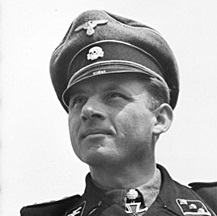
1944 – At the Battle of Villers-Bocage, German tank ace Michael Wittmann ambushed elements of the British 7th Armoured Division.
While in command of a Tiger I tank, he destroyed up to fourteen tanks, fifteen personnel carriers and two anti-tank guns … in 15 minutes.
He didn’t have a chance to celebrate his new cult status in Germany. Two months later, his group of Heavy SS-Panzer Battalion 101 tanks were destroyed near the town of Saint-Aignan-de-Cramesnil
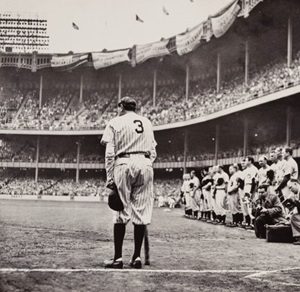
1948 – Babe Ruth visited Yankee Stadium for the final time in his life, appearing at the 25th-anniversary celebrations of “The House that Ruth Built” and to see his famous uniform number retired.
By this time, his battle with cancer had caused him to lose a lot of weight and he had difficulty walking, so when he was introduced along with his surviving teammates from 1923, Ruth used a bat as a cane.
Nat Fein’s photo of Ruth (“The Babe Bows Out”) taken from behind, standing near home plate and facing “Ruthville” (right field) became one of baseball’s most famous and widely circulated photographs, and won the Pulitzer Prize.
Babe died two months later.
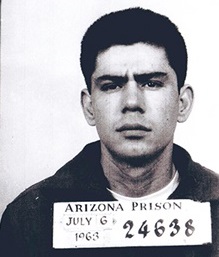
1966 – It has been heard so many times in television and film dramas that it has almost become a cliché, but on this date, the U.S. Supreme Court handed down its decision in Miranda v. Arizona, establishing the principle that all criminal suspects must be advised of their rights before interrogation.
The roots of the case went back to March 2, 1963, when an 18-year-old Phoenix woman told police that she had been abducted, driven to the desert and raped. Tracking the license plate number of a car that resembled that of her attacker’s brought police to Ernesto Miranda, who had a prior record as a peeping tom.
Although the victim did not identify Miranda in a line-up, he was brought into police custody and interrogated. Officers left the interrogation with a confession that Miranda later recanted, unaware that he didn’t have to say anything at all.
Miranda was convicted but while serving his sentence in Arizona state prison, the American Civil Liberties Union took up his appeal, claiming that the confession was false and coerced.
The Supreme Court overturned his conviction on this date, but Miranda was retried and convicted in October 1966 anyway, despite the relative lack of evidence against him.
Remaining in prison until 1972, Ernesto Miranda was later stabbed to death in the men’s room of a bar after a poker game in January 1976.
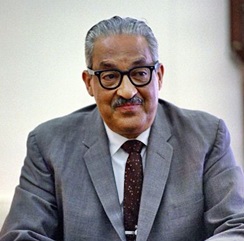
1967 – President Lyndon Johnson, declaring that it was “the right thing to do, the right time to do it, the right man and the right place,” appointed U.S. Court of Appeals Judge Thurgood Marshall to fill the seat of retiring Supreme Court Associate Justice Tom C. Clark.
On August 30, after a heated debate, the Senate confirmed Marshall’s nomination by a vote of 69 to 11. Two days later, he was sworn in by Chief Justice Earl Warren, making him the first African American in history to sit on America’s highest court.
In his twenty-four year tenure, he voted to uphold gender and racial affirmative action policies in every case in which they were challenged.
He dissented in every case in which the Supreme Court failed to overturn a death sentence and opposed all efforts to narrow or burden the right of women to obtain abortions.
No justice was more libertarian in terms of opposing government regulation of speech or private sexual conduct.

1971 – The New York Times began publishing portions of the 47-volume Pentagon analysis of how the U.S. commitment in Southeast Asia grew over a period of three decades.
Daniel Ellsberg, a former Defense Department analyst who had become an anti-war activist, had stolen the documents. After unsuccessfully offering the documents to prominent opponents of the war in the U.S. Senate, Ellsberg gave them to the newspaper.
Officially called The History of the U.S. Decision Making Process on Vietnam, the “Pentagon Papers” disclosed closely guarded communiques, recommendations, and decisions concerning the U.S. military role in Vietnam during the Kennedy and Johnson administrations, along with the diplomatic phase in the Eisenhower years.
The publication of the documents precipitated a crucial legal battle over “the people’s right to know,” and led to an extraordinary session of the U.S. Supreme Court to settle the issue.
Although the documents were from the Kennedy and Johnson administrations, President Richard Nixon opposed their publication, both to protect the sources in highly classified appendices, and to prevent further erosion of public support for the war.
On June 30, the Supreme Court ruled that the Times had the right to publish the material.
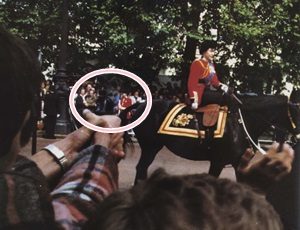
1981 – Seventeen year old Marcus Sarjeant fired six blank shots from a starting pistol at Queen Elizabeth as she rode her horse during a Trooping the Colour ceremony in London.
As the shots were fired, The Queen’s horse, Burmese, shied at the noise and almost bolted. Elizabeth, almost completely unflinching, simply leaned forward to comfort Burmese. The Queen was unharmed.
Sarjeant pleaded guilty to a charge under the 1848 Treason Act and was jailed for five years. Asked why he pulled the outrageous stunt, Sarjeant said, “I wanted to be famous. I wanted to be a somebody.”
Sarjeant was released from Grendon Psychiatric Prison in Buckinghamshire in October 1984, at the age of 20. He changed his name and began a new life.

1983 – Pioneer 10 became the first man-made object to leave the central Solar System when it passed beyond the orbit of Neptune.
Before it arrived at that point, it entered the asteroid belt, a doughnut-shaped area that measures 175 million miles wide and 50 million miles thick. The material in the belt travels at speeds up to 45,000 mph and ranges in size from dust particles to rock chunks as big as Alaska.
Accelerating to a speed of 82,000 mph, Pioneer 10 – which began its mission in 1972 – then passed by Jupiter in December 1973.
The mission came to an official end on March 31, 1997, but although the mission was officially over, Pioneer 10 continued to transmit. The last successful reception of clean data came in 2003 when the space probe was 7.4 billion miles from earth.
Today, Pioneer 10 is projected to be a truly staggering 11 Billion miles from earth and will continue to coast silently as a ghost ship into interstellar space, heading in the general direction of the red star Aldebaran, which forms the eye of the constellation Taurus.
It will take Pioneer 10 more than two million years to reach it.
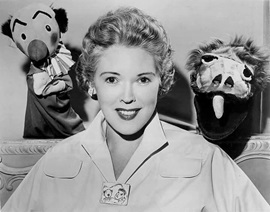
1989 – Television and radio comedian Fran Allison, best known for her starring role on the weekday NBC puppet show Kukla, Fran and Ollie, died of bone marrow cancer at the age of 81.
The program – as popular with as many adults as children – did not have a script and was entirely ad-libbed. Allison said she never knew in advance exactly what the puppets would say.
“On the air, you say exactly the same thing you would say if it happened for the first time, off the air. I adored Kukla and Ollie. They were never anything but real to me.”
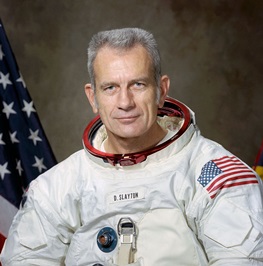
1993 – Donald “Deke” Slayton, one of the original NASA Mercury Seven astronauts and later Director of Flight Crew Operations, died from a malignant brain tumor at the age of 69.
Slayton was selected to pilot the second U.S. manned orbital spaceflight, but was grounded in 1962 by an irregular heart rhythm.
In 1972, he was granted medical clearance to fly, and was assigned as the docking module pilot of the 1975 Apollo–Soyuz Test Project, at age 51 becoming the oldest person (at the time) to fly in space.

1994 – A jury in Anchorage, Alaska, blamed recklessness by Exxon and Captain Joseph Hazelwood for the 1989 Exxon Valdez disaster, allowing victims of the oil spill to seek $5 billion in damages.
Bound for Long Beach, California, the vessel ran aground on the Bligh Reef in Prince William Sound, Alaska, resulting in the second largest oil spill in United States history.
Estimates start at 11 million gallons of oil, while some put the figure as closer to 35 million gallons.
Exxon appealed and the Ninth Circuit Court reduced the punitive damages to $2.5 billion. Exxon then appealed the punitive damages to the Supreme Court which capped the damages to $507.5 million.
In 2008, Exxon Mobil agreed to pay 75% of the $507.5 million damages ruling to settle the matter but in June 2009, a federal ruling ordered Exxon to pay an additional $480 million in interest on their delayed punitive damage awards.
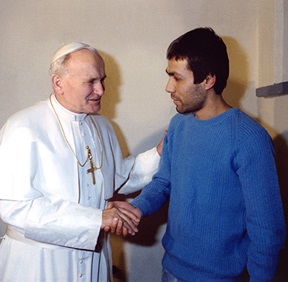
2000 – At Pope John Paul II’s request, Italy pardoned Mehmet Ali Agca, the Turkish gunman who tried to kill the Pope in 1981 after he had escaped from a Turkish prison.
After serving 19 years of imprisonment in Italy where he was visited by the Pope (see 1983 photo above), he was deported to Turkey, where he served a ten-year sentence. He was released in January 2010.
On December 27, 2014 – 33 years after his crime – he publicly arrived at the Vatican to lay white roses on the recently canonized Saint John Paul II’s tomb and said he wanted to meet Pope Francis.
The request was denied.
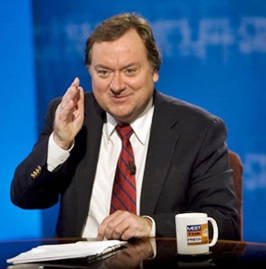
2008 – Tim Russert died of a heart attack at the age of 58.
He is best remembered as the moderator of NBC’s Meet The Press (for 16 years) and as a superb practitioner of political analysis, but his greatest legacy was his sustained style of interrogation.
Grounded in prodigious research, Russert would press his guests on past statements and contradictions, regardless of their political affiliation.

2010 – Singer, actor and businessman Jimmy Dean died at the age 81.
Dean recorded several hit songs, including Big Bad John (#1 on both the country and pop singles charts), PT-109, Harvest Of Sunshine and I.O.U..
His mid-sixties variety show featured country musicians, light comedy, and a recurring segment which featured Rowlf the Dog, one of Jim Henson’s earliest Muppets.
As actor, Dean appeared in 14 episodes of Daniel Boone and had a semi-regular role as Charlie Bullets on J.J. Starbuck. His best-known role was as reclusive Las Vegas billionaire Willard Whyte (inspired by Howard Hughes) in the James Bond movie Diamonds Are Forever.
In 1969, Dean and his brother Don founded the Jimmy Dean Sausage brand of breakfast sausage. Casting aside rumors that he was just a figurehead and not actively involved with the company, Dean later said “It was not something I just put my name on. It was my money and my sausage and my work.”
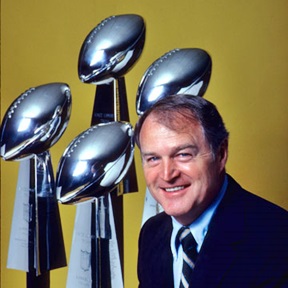
2014 – Chuck Noll, former head coach of the Pittsburgh Steelers, died of natural causes at the age of 81.
After a six-year playing career that included two NFL Championships as a member of his hometown Cleveland Browns, and several years as an assistant coach with various teams, Noll took the helm of the then lowly Steelers (which had played in only one postseason game in its previous 36 years) in 1969, and turned the franchise into a perennial contender.
As a head coach, Noll won four Super Bowls, four AFC titles, and nine Central Division championships, compiled a 209–156–1 overall record, a 16–8 postseason record, and had winning records in 15 of his final 20 seasons.
His four Super Bowl victories rank second behind Bill Belichick for the most of any head coach in NFL history.
He retired in 1991 and was inducted into the Pro Football Hall of Fame in 1993.
Compiled by Ray Lemire ©2019 RayLemire.com. / Streamingoldies.com. All Rights Reserved.